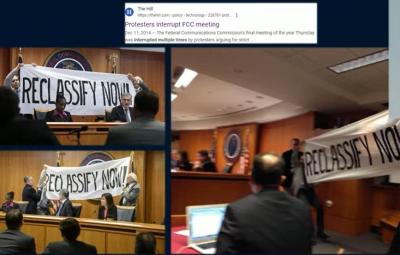-
The FCC voted to approve an order to reclassify broadband internet access service (BIAS) as a “telecommunications service” under Title II of the Communications Act of 1934
-
As a result of the reclassification, blocking, throttling or engaging in paid prioritization of traffic will be prohibited
-
Chairwoman Jessica Rosenworcel couldn’t bring the issue to a vote until a third Democrat joined the panel last year
Net neutrality is back! Similar to what happened in 2015, the FCC voted 3-2 along party lines Thursday to classify broadband internet access service as a telecommunications service, reinstating net neutrality rules.
In sum, net neutrality refers to “no blocking, no throttling and no paid prioritization.” Democrats say the rules are necessary to ensure an open and fair internet for all. Republicans say such rules impede on network operators’ ability to manage their traffic and essentially thwart competition.
“This is good for consumers, good for public safety, and good for national security. And that is why we are taking this action today under Title II of the Communications Act,” said FCC Chairwoman Jessica Rosenworcel.
Today’s order largely mirrors the 2015 order passed during former FCC Chairman Tom Wheeler’s reign.

Republican Commissioner Brenda Carr seized on that and said history tells an important part of the story about Title II. He described it as a “power grab” by former President Obama that forced the FCC’s hand.
Congress never passed a law saying the internet should be heavily regulated like a utility. “The executive branch pressured the agency into claiming a power that remains with the legislative branch,” he said.
There were lighter moments during the meeting. After Carr spent over 30 minutes reading his nine-page statement, fellow Republican Nathan Simington acknowledged his dissenting vote and deferred from reading his own written statement.
“I appreciate that,” quipped Chairwoman Rosenworcel. And when Commissioner Anna Gomez concluded her statement, “I cede the remainder of my 33 minutes,” she told the chairwoman. The audience gave its audible approval.
Reaction to the commission’s action was more or less predictable. CTIA said the FCC’s decision to “turn back the clock” threatens to undermine the wireless industry’s ability to deliver a fast, open and fair internet. On the flip side, groups like Public Knowledge claimed victory and called for stringent enforcement of the rules.
Broadband providers are expected to challenge the rules in court. During a press briefing after the meeting, Rosenworcel said the rules adopted today are court tested and consistent with the rules adopted in 2015, which were upheld by the D.C. Court of Appeals in 2016.
Addressing network slicing – a big issue for the wireless carriers looking to monetize 5G – Rosenworcel said the net neutrality rules target broadband internet access service (BIAS), which essentially refers to the basic internet service that consumers rely on every day. It’s important that service is available without fast lanes and slow lanes.
However, “we recognize there are new technologies out there like network slicing and for non-BIAS services, we know that carriers can explore them. There are a lot of business opportunities to provide specific services in the future and I think in the enterprise market, there will a lot of opportunity to continue to explore them,” she said.
The USF puzzle
Rosenworcel confirmed there are no new requirements for broadband service providers to contribute to the Universal Service Fund (USF) that could get passed onto their broadband customers. Going forward, it’s vitally important that the USF system doesn’t disproportionately put the burden of support on the average consumer household, she said, noting that big efforts are underway in Congress to reform USF.
Before the vote, groups had heavily lobbied for Rosenworcel to remove “forebearance” language from the draft net neutrality order so that USF fees could be applied to broadband providers. In the end, the FCC chose to forbear from applying Section 254(d) of the Communications Act to broadband service providers; that’s the section of the Act that requires telecom services to contribute to the USF.
Gigi Sohn, spokesperson for the Affordable Broadband Campaign (ABC), welcomed the reinstatement of the net neutrality regulations but said it’s “mind-boggling” that the agency is effectively shutting the door to a permanent subsidy, especially when the Affordable Connectivity Program (ACP) is going away.
“The FCC’s rationale for forbearing is paper thin. Mere ‘estimates’ of possible price increases do not constitute a legally defensible record, nor does the fear of increased criticism from some ISPs that are already vehemently opposed to the FCC’s welcome decision to reclassify broadband as a telecommunications service under Title II of the Communications Act,” Sohn said in a statement.
The trade group Incompas also voiced support for the new net neutrality rules but doesn’t like what’s happening with USF.
“While we support the overarching principles of this order, we remain deeply concerned about the commission's decision to forbear on Section 254(d) of the Act, which would help sustain the Universal Service Fund. The USF is in dire need of reforms and this move throws the fund into legal jeopardy and puts it on uncertain footing,” said Incompas CEO Chip Pickering in a statement.

